Taiwan's transgender teacher Huang Mingzhen: From being forced to resign to winning the "Oscar Award in Education" - is society really more inclusive and diverse?
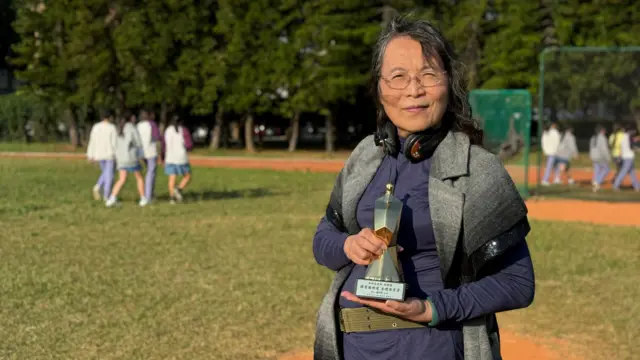
- Liu Ziwei
- BBC Chinese reporter
It took Taiwanese teacher Huang Mingzhen 17 years to go from being forced to the point of nearly resigning to being awarded the "Oscar Award for Education."
This senior female math teacher was originally a "he". Huang Mingzhen started taking hormone drugs in the 1990s for more than a decade. In 2009, she underwent gender reassignment surgery, transforming from a gentle male teacher to a passionate and humorous female teacher.
On the eve of Teachers' Day in 2024, she was awarded the highest honor, the "Teacher Award" by the Taiwan Ministry of Education and received the trophy from Taiwan's President Lai Ching-te. She was one of the 72 teachers in Taiwan who won the award and the first transgender teacher to win the award, becoming the focus of news.
This is not the first time that Huang Mingzhen has been in the news. In 2007, she made headlines with titles such as "Male teacher at a prestigious school wanted to undergo sex reassignment but was forced to take leave without pay" and "Education Bureau to investigate sex reassignment controversy involving male teacher at a prestigious school".
The media reports, which were published nearly 20 years apart, reflect Taiwan's shift from rejection to acceptance of LGBTQ people, especially transgender people. Taiwan also gradually revised laws related to gender equality during this period, and diverse gender issues came into the public eye.
"It is also very unfair to the teachers (other winners) who won the Teacher Award this year, because half of the news in those days was about me..." Teacher Huang said apologetically when he was interviewed by BBC Chinese.
“I think education can really change everything. Although it takes a while, you can always see the results after ten or twenty years.”
Most of Huang Mingzhen’s life seems to be a microcosm of the development of gender education in Taiwan.
“Obviously Not Real”: Growing Up and Becoming an Adult in Repression
Huang Mingzhen, 65, whose real name is Huang Mingzheng, is known as "Ming Ming Jiu Zhen" (明明就真) on LINE, the most commonly used communication software in Taiwan.
Is the name a declaration of transgender identity? Huang Mingzhen joked to the BBC reporter that she used to be called Huang Mingzheng, but as a man, she was "not pretty at all". At the age of 50, she underwent gender reassignment surgery and changed her name to Huang Mingzhen, but in the eyes of outsiders, her female body was "not real at all".

"I want to be a girl." Huang Mingzhen has been telling her family this repeatedly since kindergarten. To appease her, the elders would say, "Just be a good girl, and you will naturally become a girl when you grow up."
"So I was always very good and never did anything wrong." Huang Mingzhen recalled that she was low-key and obedient throughout her school days. After entering junior high school, even though she knew that no matter how good she was, she could not become a girl, she was still afraid that if she behaved too conspicuously - whether in academic performance or gender temperament - she might be treated unfriendly by her classmates, so she continued to be a quiet and good student.
She said that the most painful period for her living as a man was the two years of military service. She had to eat, sleep and shower with a group of boys 24 hours a day, and she could only endure it. "In that era, you had to adapt to the environment yourself, otherwise you couldn't survive. So I didn't resist strongly, I just went along with it, and (could only) feel uncomfortable in my heart."
After retiring from the army, he followed the mainstream life trajectory of society, married his wife whom he had been dating in college, and had two daughters.
When he confessed his love to his wife, she clearly expressed that "I want to be a girl and have a sex change operation in the future", but his wife thought that he would not really do it, so she did not strongly oppose it. It was his father-in-law who opposed it. He thought Huang Mingzhen looked "too feminine" and advised his daughter to think twice. "My wife felt at that time that she had fallen in love and would never look back." Huang Mingzhen is still very sure that his feelings for his wife are a same-sex love between a girl and a girl.
It was during this period that Taiwan society experienced the lifting of martial law in 1987 and a series of social movements. The democratization process was surging, and gender issues such as the women's movement, gender studies, and gay rights began to enter the public eye.
But this did not relieve Mr. Huang's inner depression. On the surface, he was still living the life of a typical "head of the family".
In the early 1990s, she joined the famous private Christian Cooperative Senior High School in Chiayi County and began to take hormone drugs intermittently, but did not undergo complete gender reassignment drug treatment.
After getting married and having children, she still wanted to be a girl. She took hormones to grow breasts and have a more feminine appearance. She dressed up as a girl at home, and her wife and daughter knew about it.
Although her appearance has changed, her feelings for her wife remain the same. In early 2000, the couple gave birth to twins, a boy and a girl. Not long after the twins started elementary school, Huang Mingzhen underwent gender reassignment surgery. When the two children grew up, they had almost no impression of Huang Mingzhen, the image of their "father". In the Huang family, one of their parents is called "Mom" and the other is called "Mommy".
Suffering injustice on a conservative campus
In 2000, the "Ye Yongzhi Incident" led to the amendment of the Gender Equality Act. 15-year-old junior high school student Ye Yongzhi was often bullied by classmates because he was "sissy". He was forced to take off his pants, and some classmates even waited in the toilet to bully him. On the day of the incident, he went to the toilet five minutes before the end of get out of class as usual. The empty toilet should have made him feel at ease, but he accidentally slipped and no one found him in time. He died after being sent to the hospital. Afterwards, the Ministry of Education set up an investigation team, and the report showed that he was often bullied because of his feminine gender characteristics. This incident attracted social attention, led to discussions on gender education, and became an opportunity to amend the "Gender Equality Education Act".
In 2004, the "Gender Equality Education Act", which originally divided schools based on traditional binary gender, was changed to the "Gender Equality Education Act", which stipulates that "schools should provide a gender-equal learning environment, respect and consider the different genders, gender temperaments, gender identities or sexual orientations of students and faculty and staff, and establish a safe campus space."
Despite the laws protecting the rights of diverse genders, Huang Mingzhen still suffered unfair treatment at that time.
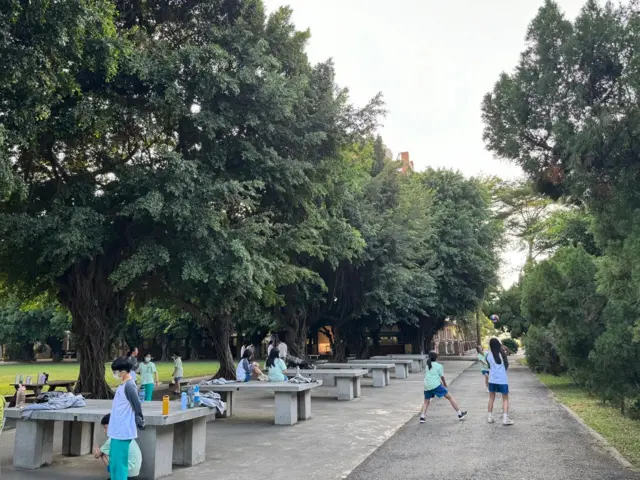
In order to hide her bulging breasts caused by taking medicine, she wore a coat all year round at school and had no problems with the school for more than ten years. But in 2007, the new school management asked her to make a choice - whether to sign a pledge to give up dressing as a woman, or to pack up and leave.
At the time, Huang Mingzhen's twins were only 7 years old, and her wife was a housewife. She shouldered the financial burden of a family of six, but she was determined not to give in: "If I quit, I will have to find another teaching position, but there will be absolutely no place for me, so I will never quit."
During the stalemate, the school began to put pressure on her. For a whole year, the school sent people to watch her classes almost every day to see if they could catch her saying something wrong or behaving inappropriately, so as to force her to resign. This caused her great psychological pressure. The school even intended to reduce her teaching hours, which was equivalent to a disguised salary cut.
A colleague could not stand it and provided Huang Mingzhen with a channel to appeal to the higher level of the Ministry of Education, so she was spared from a pay cut. Through the coordination of the Chiayi County Government and the Ministry of Education, Huang Mingzhen retained her teaching position, but she was still deducted points in the annual performance evaluation for "affecting the school's reputation."
The news that she was forced to resign by the school was reported by major mainstream media. Huang Mingzhen learned through indirect inquiries that the reason why this campus turmoil spread was that it was the students who supported her who broke the news to the media.
According to the report, the principal said that he had suggested that Huang take a leave of absence but never suppressed her. He also said that a few parents were worried that their children would be affected. The Ministry of Education responded that there was no rule that gender reassignment means a teacher is unqualified and that the case would be reviewed again.
After the conflict with the school, she was "frozen" in school, and the teaching project she was originally responsible for was called off. She "suddenly had free time" and began to study gender issues in depth. When communicating with netizens, she learned detailed information about gender transition.
In 2009, at the age of 50, she went to Thailand for surgery, changed her gender and changed her name to Huang Mingzhen, finally becoming the girl she had longed to be since childhood.
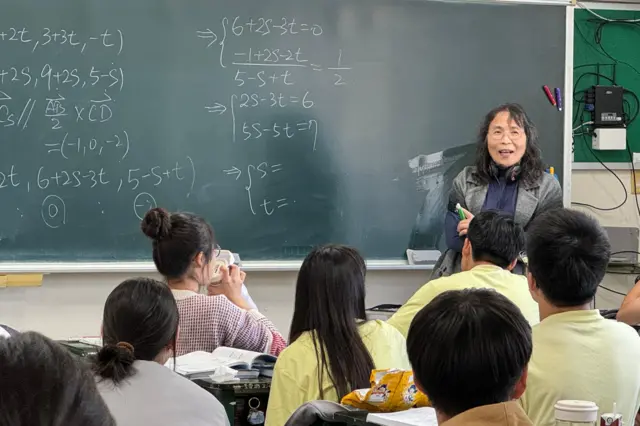
Huang Mingzhen recalled that her wife, who had been with her for many years, finally chose to support her in having the surgery: "If I had always opposed it, I would have been very unhappy. If I were very unhappy, she would not be happy either." Huang Mingzhen still lives with his wife. His second daughter also teaches in the same school, and the mother and daughter sometimes have lunch together.
The current school authorities responded to the BBC's inquiry, saying that the school management 17 years ago had all left the school and they were unable to obtain the details of that year. The current school authorities affirmed Mr. Huang's teaching professionalism: "In today's society of diverse identities, even in a conservative education field, he should be respected."
“Invisible” trans people?
There is no official statistics on the number of transgender people in Taiwan, but according to data from the University of Hong Kong and the Canadian Census, transgender people make up approximately 0.3 to 0.4% of the population. Based on this, it is estimated that there are nearly 70,000 transgender people among Taiwan's 23 million population.
However, the Hong Kong survey report also pointed out that the transgender population is difficult to estimate because of the stigmatization and low acceptance of transgender people in society, which makes them generally unwilling to disclose their gender identity.
According to a survey published by Taiwan's Heart Foundation in early 2020, 49.5% of transgender people said they had experienced gender-based violence, which means that one out of every two transgender people had experienced gender-based violence. The top three types of gender-based violence are bullying, mental violence, and high-pressure control.
Focusing on the situation of underage transgender people on campuses below the university level, in 2020, the Taiwan Alliance for the Promotion of Partner Rights (TAR) released a survey report showing that transgender students are still treated unfriendly on campus, with the situation being most serious in junior high school (74.09%), high school (59.92%), and elementary school (43.32%) when secondary sexual characteristics begin to develop.
Jian Zhijie, secretary general of the Partners' Alliance, said in an interview with BBC Chinese that "schools generally have a very low level of understanding of transgender issues" and that many teachers are still unable to distinguish whether students want to dress up or have a clear gender identity.
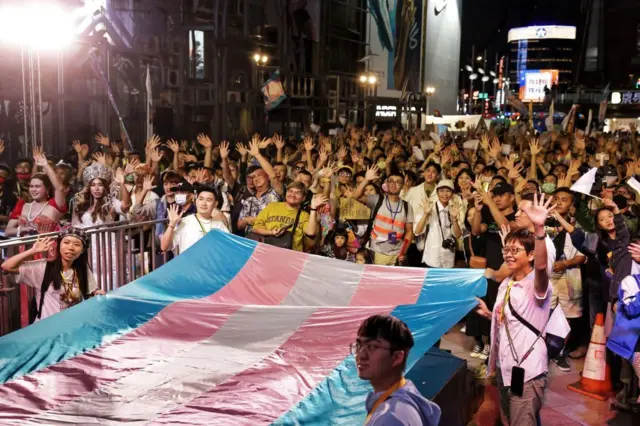
Currently, most schools below the junior college level still manage students based on gender, from uniforms, toilets, locker rooms, swimming lessons, to separate rooms for graduation trips, etc. Many systems and spaces are divided into male and female genders. Tsai Ying-Chih, director of policy advocacy at the Taiwan Gay and Lesbian Counseling Hotline Association (hereinafter referred to as the Hotline), said that in a campus with gender dichotomy, transgender students either fight for their rights but often fail, or are forced to come out.
Education becomes the main battlefield?
In 2019, same-sex marriage was officially legalized in Taiwan, but the Taiwan Gender Equality Education Association released a survey showing that support for gender equality education was 71.2% in 2023, down 2.3% from 2022, marking the first decline in support after three consecutive years of growth. Among them, the number of opponents aged 65 and over has increased significantly.
Association director Yung Li-su told the BBC that in the years after 2016, there was a heated debate on gay issues and some booksellers received complaints from conservative forces. Although the Ministry of Education did not intervene in content modification, after weighing the market, textbook manufacturers still deleted or simplified some gender diversity content. Teaching about transgender people is even rarer than gay education, and is almost zero.
Yung Li-su analyzed that the education sector is relatively indifferent and conservative towards gender issues and will not actively follow group initiatives. "The campus atmosphere follows the social trend." She gave an example that the content of the gay education course was implemented as early as 2011, but "some teachers did not dare to teach." It was not until same-sex marriage was legalized that teachers found it easier to teach.
Huang Mingzhen affirmed the role of the Gender Equality Education Act in an interview. It has been 20 years since the law was implemented, and students' tolerance and respect for diverse gender traits have significantly improved. "Now many students openly talk about their sexual orientation, and no one comes to me to talk about gender identity troubles."
She also observed that in recent years, the school has cooperated with the Ministry of Education's policies and relaxed the strict clothing and appearance requirements for students. Female students who dress in a neutral style, have long hair, and wear headbands will not receive special attention from teachers and male students.
Eight years after Huang Mingzhen’s conflict with the school, another transgender teacher made the news. The school’s completely different way of handling the matter shows the change in Taiwanese society’s tolerance for transgender people.
In 2015, a biology teacher at the prestigious public high school "Taichung First Senior High School" named "Zeng Guochang" announced that she had changed her gender to "Zeng Kaixin" and received support from all the teachers and students in the school. The school even built a friendly toilet to help her adapt to her new identity.
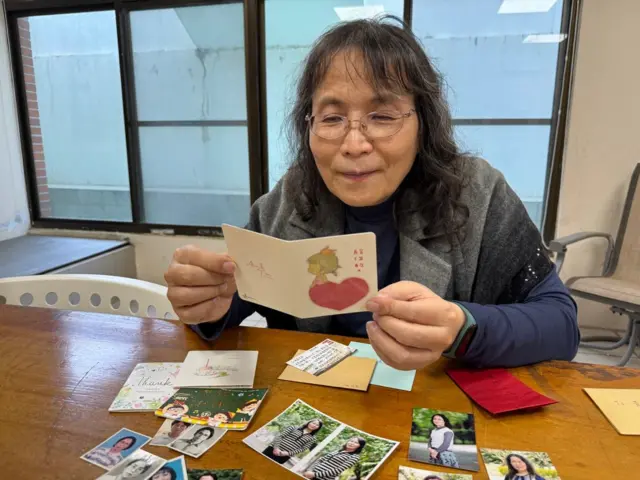
Huang Mingzhen said that her story was the first positive report on transgender people in the history of Taiwanese media, which was different from the earlier reports that used discriminatory names and curious angles such as "shemale" and "transgender people's special life". "Because I am a high school teacher, I have a positive identity in society. Otherwise, it would be difficult for anyone with a transgender identity to find a decent job."
Hotline research also shows that in Taiwan, identification documents are required in many situations. When the gender on the document does not match the appearance of the transgender person, it often causes trouble for transgender people when seeking employment, seeking medical treatment, or being stopped by the police.
The 2023 Taiwan Transgender Living Conditions Report pointed out that more than 80% of transgender people have been treated unkindly in the workplace. Nearly 20% of transgender people have been discriminated against but dare not complain, and have been rejected for job applications due to their transgender identity.
“Live your true self”
Walking on the campus of Xietong Middle School, students often greet Huang Mingzhen loudly. "Teacher, do you want to play ball with us?" Invitations outside the classroom are endless. During lunch break, she will also patiently stop and explain the test questions to the students.
Huang Mingzhen, who is considered serious, humorous and easy to get along with by students, gradually changed from her original low-key and submissive personality to her natural liveliness after undergoing gender reassignment surgery.
"I initially thought she was just an ordinary female teacher," Yan Boxun, founder of Zhangliang Technology, told the BBC. He was in the first grade of junior high school in 2014, and for a whole half semester, he did not realize Huang Mingzhen's transgender identity until his classmates prompted him to search the teacher's name online.
Yan Boxun would come to Huang Mingzhen to ask questions almost every day during lunch break, ranging from high school textbooks to university mathematical theories... He later founded a space technology company that had a cooperative relationship with Space X, and the technology foundation of its company came from the science exhibition topics he had in high school.
At first, his family and other conservative teachers would ask him what was so special about his relationship with Huang Mingzhen. Yan Boxun believes that Huang's specialness is not in his gender, but in "guiding students to explore different possibilities independently" and "encouraging students to think outside the box."
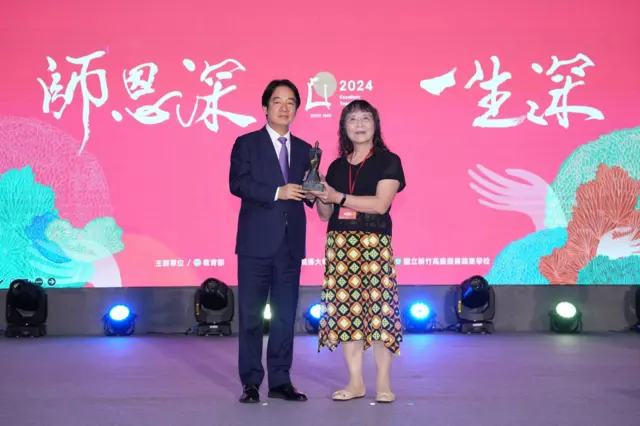
Liu Liyin, principal of Pinglin Elementary School in Chiayi County, who was in charge of reviewing the written materials of the Ministry of Education's outstanding teachers, revealed that Huang Mingzhen did not mention her transgender identity at all in her materials and was recognized for her teaching achievements over the past 30 years.
Huang Mingzhen told the BBC that she only made her identity public during the final selection phase in order to thank those who had helped her that year: "I don't have any formal way to thank them, so when I was giving my speech, I brought this (transgender identity) up." She reiterated many times that she is most likely not "the first transgender teacher to receive the Teacher Award," she is just the first to make her identity public.
“If one day, a transgender person wins the Teacher Award and it is no longer a news event, then transgenderism will no longer be a problem in society, and gender equality will be truly achieved.”
Comments
Post a Comment